#mystery sufi
Explore tagged Tumblr posts
Text

7 notes
·
View notes
Text
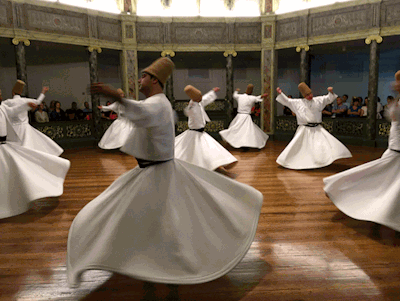
How I feel when I read Rumi. . .and Mary Oliver
8 notes
·
View notes
Text
The Secret Within Music Gurdjieff, Steiner, And The Sufis, Music By Laurence Galian - 432
#The Secret within Music#The Sufis#SoundCloud#Gurdjieff#Spiritual music#mystery#divine beauty#harmony
3 notes
·
View notes
Text
A-Z Dictionary of Esoteric Terminology

for your next poem/story (pt. 1)
Esoteric—designed for or understood by the specially initiated alone; may refer to the occult
Affenicum - a word for soul
Barakah - soul power; a blessing bestowed by a holy person
Cthonian - something associated with the earth and the underworld
Deity - the personification of some force or concept of great magnitude; a being embodying the essence or entirety of an aspect of existence
Egrigor - a thought form created by will and visualization
Fana - a Sufi term meaning "becoming absorbed in God"
Godhead - divine Nature or Essence; the source of all emanation and manifestation, of which all deities are but aspects or facets
Host - from the Latin hostia, meaning "a sacrificial victim"
Ineffable name - a name for God which either must not or cannot be spoken
Jnana - literally "primordial knowing"; wisdom; the activity of enlightenment; knowing, which transcends all dualistic conception; perfect intuition
Kalpa - the longest describable span of time
Libation - the act of pouring a liquid on a symbolic figure of a deity, or on the ground
Mania - a Roman goddess of the dead who ruled over the lares and manes in the underworld; she is sometimes called the "Mother of Ghosts"
Neti - literally, "not this, not that"; it refers to the idea that the supreme godhead is transcendent and cannot be described or understood
Occult - from Latin occuiere, "to cover up"; not revealed; secret; mysterious
Pantheon - from Greek pantheios, "of all gods"; the arrangement or hierarchy of deities and spirits within a particular system
Qlippoth - literally "shells"; usually described as a plane/s containing demons, negative or disintegrating spirits, elementals, and the degenerating shells of the dead
Rapport - resonance; an interface relationship involving energy exchange such as the relationship between hypnotist and subject, control and medium, or object and psychometrist
Sandarace - an alchemical term for the fiery form of Spirit
Thaumaturgy - miracle working; magic used to make overt changes in the material world
Unction - ceremonial anointment with oil; sometimes performed as an act of consecration; also used in rites for the severely ill or dying, as in the case of extreme unction; in ceremonial magic, unction is often used as a symbol of the quest for initiation, or the dedication (consecration) of the magician to enlightenment
Vac - literally "speech" or "word"; cosmic reason or pattern, somewhat similar to the Greek idea of Logos
Wic - an Old English word meaning "to bend, to twist, or to wiggle"; a very old term for the practice of magic; also had been translated as "to weave, or to know"
Xeni Nephidei - spirits who delight to reveal to people the hidden properties of nature
Yaksha - a nature spirit which resides in a tree, usually regarded as female; are said to accompany Kubera, the god of wealth
Zen - a system of mental stillness originating in India, where it was known as dhyana; the goal is to permit experience by direct perception or intuition
Source ⚜ More: Word Lists
#esoteric#terminology#writing reference#dark academia#writeblr#langblr#spilled ink#writers on tumblr#poets on tumblr#writing prompt#literature#poetry#creative writing#lit#light academia#novel#writing inspiration#writing ideas#pierre puvis de chavannes#writing resources
127 notes
·
View notes
Text
Hazrat Inavat Khan 伊納亞特·汗 1882-1927(Inayat Khan Rehmat Khan)是印度音樂學教授,歌手,辯才天女的倡導者,詩人,哲學家和蘇非主義向西方傳播的先驅。
He was an Indian professor of musicology, singer, exponent of the saraswati vina, poet, philosopher, and pioneer of the transmission of Sufism to the West.
《 The mystery of sound is mysticism 聲音的奧秘就是神秘主義 》
youtube
“Some people look for a beautiful place. Others make a place beautiful.”
— Hazrat Inavat Khan (Sufi teacher)
#hazrat inavat khan#sufi teacher#sufism#聲音的奧秘就是神秘主義#the mystery of sound is mysticism#make a place beautiful the best
7 notes
·
View notes
Text

Himalayas from space
(Science and Astronomy)
* * * *
"The Earth listens and it hears; it has language; it has a soul. We are all part of its song of life. If we give thanks, if we allow ourselves to be human, if we attune to the Real, all creation will respond."
"At this present time there is a hunger for direct inner experience, a need to reclaim our spiritual heritage. While our materialistic culture tries to keep our attention firmly in the physical world of the senses, many of us sense a longing to know this hidden mystery of what it means to be human. And so we are able to turn to the teachings and traditions that have been given to us, whether in yoga, Buddhist meditation, Sufi dhikr or other spiritual practices.
It is important to recognize the root of our longing, that we are no longer prepared to live in a purely physical world, but need the living presence of the spiritual. We need to know and be nourished by the invisible world that is within us and all around us. We need to reclaim the mystery and magic of being fully alive."
~ Llewellyn Vaughan-Lee
(Ian Sanders)
#Ian Sanders#quotes#Llewellyn Vaughan-Lee#Himalayas from Space#the Earth#the inner#mystery#magic#direct inner experience#our spiritual heritage#the senses#the root of our longing
34 notes
·
View notes
Note
List 5 things that make you happy! Then put this in the askbox for the last 10 people who liked or reblogged something from you!
Ur that one who liked my post :D
HERE YA GO:
1. watching the all videos of toca boca
2.drawing on my phone
3. Playing MM2 (murder mystery 2) on roblox
4. Swimming on swimming pool
5. eating chips
@artismeyou-12 @neko-sufis-world @vurlient @0xxjustdianaxx0 @monsterartt and anyone
#boba#kurosamochi#hehe#hehe:3#answered#boop#list of 5 things#mutuals#kutosamochi#kutisamochi asks#kutisamochi
21 notes
·
View notes
Text
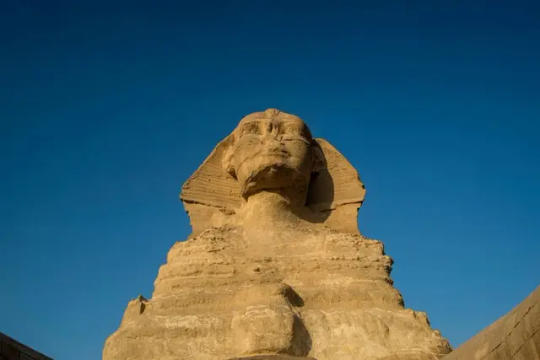
The Hunt: What Happened to the Great Sphinx’s Nose?
The mystery of the Egyptian statue's missing nose has fascinated people for centuries.
Much like the desert winds that perhaps helped shape it, conspiracy theories swirl around the Great Sphinx guarding the Giza plateau—especially regarding how the winged lion’s human head lost its nose. One enduring hypothesis blames Napoleon Bonaparte’s troops for blowing the snout off during target practice. While that conspiracy’s long-debunked, it persists in popular culture. Director Ridley Scott knowingly depicted the myth in last year’s Napoleon biopic, without sacrificing any of his film’s critical acclaim. However, Egypt’s Dr. Zahi Hawass told Britannica, “We have, really, to say to everyone that Napoleon Bonaparte has nothing to do with destroying the Sphinx’s nose.”
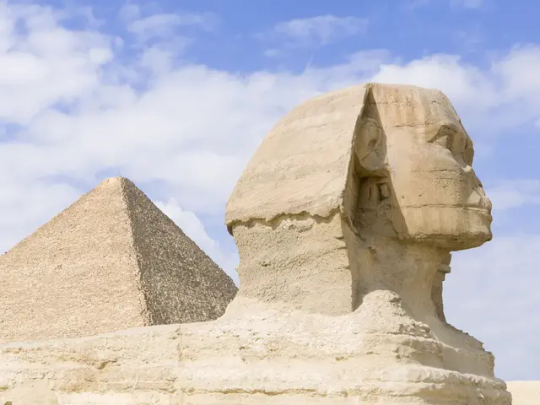
Napoleon’s 1798 battle didn’t even take place on the Giza plateau, but 10 miles north at Imbabah. Some theories have posited that storms and earthquakes shook the Sphinx’s nose from its face. Others squabble over which regional conflict (if not Napoleon’s Battle of the Pyramids) led to the nose’s destruction. In 1990, J.P. Lepre noted that “the figure was used as a target for the guns of the Mamluks,” who were actually Napoleon’s opponents.
The French emperor did, however, lay eyes on the Sphinx’s face when he arrived in Giza, with many soldiers, painters, and engravers in tow. “Thousands of years of history are looking down upon us,” he reportedly exclaimed beneath the monument’s gaze. Napoleon didn’t respect borders, but he did respect history. The Waterloo Association called the lingering accusations against him “particularly unjust because the French general brought with him a large group of ‘savants’ to conduct the first scientific study of Egypt and its antiquities.” The resulting Orientalist survey ignited an Egyptian fervor back in Europe.
Primary materials prove the nose removal predated Napoleon, too. Danish naval captain Frederic Louis Norden’s sketch from 1738 depicts the Sphinx without its central facial feature. What’s more, French naturalist Dr. Pierre Belon visited the Sphinx in 1546, writing that it had sustained damage and “no longer [had] the stamp of grace and beauty so admired by Abdel Latif in 1200”.
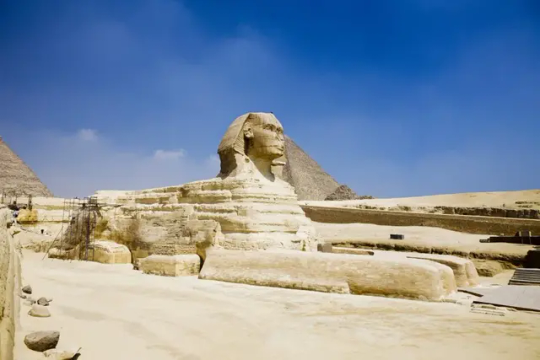
Medieval Arab scholars such as al-Maqrīzī pin the damage on Muhammed Sa’im al-Dahr, a 12th-century Sufi Muslim from a respected Cairo convent, who was allegedly angry that peasants used the Sphinx to entreat Abul Hol (the Arabic name for the sphinx) into helping their harvests. Removing an idol’s nose was an accepted method to suffocate spirits inside. Still, the details remain up for debate. Hawass believes that al-Dahr acted alone. Others claim he hired men to desecrate the Sphinx. Most experts, however, agree the great statue’s nose came off with a chisel. It is also generally accepted that al-Darhr’s actions got him killed by angry villagers. Sadly, the nose itself has likely crumbled into the desert.
By Vittoria Benzine.
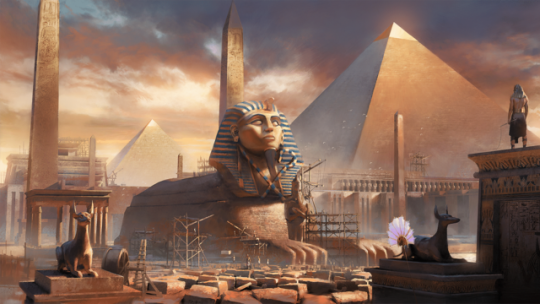
#the sphinx#The Hunt: What Happened to the Great Sphinx’s Nose?#Giza Plateau#sculpture#statue#pharaoh Khafre#ancient artifacts#archeology#archeolgst#history#history news#ancient history#ancient culture#ancient civilizations#ancient egypt#egyptian history#egyptian gods#egyptian pharaoh#egyptian mythology#egyptian art#ancient art
16 notes
·
View notes
Text
some notes on sufism

The other day I went to the Harvard Divinity School Muslims iftar (the meal that breaks the fast during Ramadan), which was followed by a concert of Turkish music that is traditionally performed in Sufi lodges in Istambul. Before the music began, the professor I’ve been auditing Islamic literature classes with read some verses from Rumi’s Masnavi and offered a meditation on fasting through an interpretation of the lines: “If you have closed this mouth, another mouth is opened, which becomes an eater of the morsels of mysteries.” That is the nature of mystical knowledge—gnosis (or maʿrifa) is not understood intellectually, but tasted (dhawq). The closing of the bodily mouth is an opening of the spiritual mouth. He asked us to listen to the music with the inner heart.
I went with my friend S, who has been nudging me toward conversion. I’ve been allergic to religion most of my life because I’m not really much of a joiner. I distinctly remember being in (Catholic) Sunday School as a child and thinking to myself: This sounds fake to me. As in, made-up, irrational. The people who treated the fanciful stories like fact seemed like crackpots to me, even to my child-mind. I don’t think I ever believed in Santa either—I guess my disposition was innately skeptical; perhaps that contributed to my identification with anarchism from when I was 13 or 14. Yet at the same time, my feeling for the invisible, for the world of the dead, was always quite strong, even when it was unstitched from a belief system. As a kid I would wander the house alone at night, thinking I could hear my dead parakeet chirping from a shoebox in the garage.
I hated Sunday School. While I was always good at school-school (at least when I was a child, before I became an incorrigible truant), I was terrible at Sunday School. Because it seemed like hocus-pocus to me, none of it stuck. My classmates had internalized all the stories I thought were outlandish. During mass I would think exclusively about donuts, the ones we would buy from the ladies who would sell them as a fundraiser. I’ve thought about returning to Catholicism, but sadly, after the post-1970s political realignment in the US, all the leftist Catholics (the Marxists who loathed the Vietnam War and exposed the FBI’s COINTELPRO) are gone. As much as I love reading Catholic mystics (St Teresa of Avila, St John of the Cross, Angela of Foligno, Hildegard of Bingen, Meister Eckhart, Marguerite Porete, and others), Christian mysticism is more individualist than Islamic mysticism—asceticism and separation from the group is the way to commune with God, while Islamic mysticism is rooted in communal practices like sama (singing, dancing, reciting poetry, playing/listening to music) and dhikr (communal prayer for the remembrance of God). While Christian mysticism bears the imprint of the Neoplatonist trajectory of ascent, for Sufism, the trajectory is shaped like a paisley. After fana (annihilation of the ego/union with God/dying before you die), there is baqaa or subsistence, a return of sorts.
I also much prefer the Islamic orientation to the created world than the Christian one, for in Islam, everything in creation can be understood as the breath or speech of God. The Hadith on which Sufi cosmology is based reads, “I was a hidden Treasure and Loved to be known, so I created the world that I might be known.” All of creation is a mirror to reflect God (this is why you must polish the rust from your heart, for the human heart can manifest all the names and qualities of God). In the Islamic mystical tradition there is an affirmation of the created world even though God and creation are not the same (as is the case in Pantheism). Everything has ontology. Nothing has ontology. The Sufi metaphysicians ask us to see with two eyes. The drop is not the ocean at the same time it cannot be separated from the ocean.
7 years ago I read Reza Aslan’s God: A Human History. After sampling the platter of world religions I joked to myself, Hmmm, if I had to pick the one I vibe with most, I guess it would be Sufism (Islamic mysticism). I didn’t know anything about Sufism other than the Rumi and Hafez poetry I read as a teenager, but the way Aslan described Ibn ‘Arabi’s concept of 'wahadat al-wujud' (or Unity of Being) reminded me of Spinozism. I guess what I’m trying to say is...I just think Sufi metaphysics is...right. Or, it speaks to how I tend to think about reality. It’s not something I can prove (that I don’t exist, while at the same time I am part of the ALL that is God), but it makes the most sense to me.
In the Sufi literature class, S jokes to me: “You’re the only non-Muslim in this class.” The same was probably true at the iftar + concert. S points to someone from the class: “The Maoist is a recent convert. This is their first time fasting for Ramadan.” “Is [our professor] fasting?” “Of course. I saw him at the iftar last night and talked to him about translation. I told him it’s ghastly to try to fit Persian verse into an English rhyme scheme. He agreed with me.” (We are clearly partisans of blank verse translations… yet so much of what’s out there has been poorly translated or not translated at all.)
Much of the lyrics sung with the gorgeous music were verses written by the great Turkish-language Sufi poet and mystic Yunus Emre ("the Dante of Turkey," I whispered to S). S was ecstatic listening to the haunting ney (a kind of flute). We just so happened to be sitting in the same row as the professor. I tapped S and whispered that it looked like he was really enjoying the music. He was smiling with his eyes closed and swaying his head from side to side. He looked like he was having...a profound experience. This prof usually has what I guess you’d call ‘resting bitch face’ (which I always found funny because it runs counter to his sweet and gentle personality). But not at the concert. Pure bliss was painted on his face. It was then that it dawned on me that Sufism, for him, was probably something more than a scholarly interest. I thought about what it must have been like to discover something so beautiful and profound, and to know, in that moment, that your life will be changed forever—you might go off to Iran and devote your entire life to studying medieval texts.
Of course this Ramadan I am thinking continuously about the genocide in Gaza, how an entire population is being starved to death by the sadistic leaders of Israel, how terrible it must be to be bombed and shot at during the holy month, or to break your fast with boiled grass and animal feed. I feel truly ashamed to come from a country that is complicit in this violence. I hope everyone continues to apply pressure to end this war—it feels hopeless now, but it is making a difference.
26 notes
·
View notes
Text

Pan & Selene 'Rosa Mystica' Talon Abraxas
One of the most beautiful and significant symbols of the Western Mysteries is the Rose. The Rose and the Grail share many spiritual resonances. The word ‘chalice’ comes from the Latin word, calyx, which means cup, and is the name given to the cup-like sepals of a flower which support the petals. Both these symbols suggest the receptive vessel of the soul, opening to receive the in-pouring of Divine influence. Indeed the symbolism of the Rose is even more complex than the Grail, given the beauty of its form, the number and arrangement of the petals with their velvety texture, the intoxicating perfume and, deep inside, the hidden golden heart enfolded within the petals, concealing the Mystery of the Centre. A 12th century Persian poet wrote, “Mystery glows in the rose bed, the secret is hidden in the rose.” Not surprisingly, the rose has long been recognized as the western equivalent of the eastern lotus as a symbol of the unfolding of higher consciousness.
In medieval Europe, the Rose as a symbol of union with the divine may have been influenced by Arabian and Persian teachings from the time when Spain was an Islamic country. The Sufi teacher, Hazrat Inayat Khan writes:
Just as the rose consists of many petals held together, so the person who attains to the unfoldment of the soul begins to show many different qualities. The qualities emit fragrance in the form of a spiritual personality. The rose has a beautiful structure, and the personality which proves the unfoldment of the soul has also a fine structure, in manner, in dealing with others, in speech, in action. The atmosphere of a spiritual being pervades the air like the perfume of a rose.
18 notes
·
View notes
Text
The moon holds deep symbolic meaning in Persian culture, often appearing in poetry, literature, and art. It has been a source of inspiration for Persian poets, mystics, and lovers for centuries. Here are a few ways the moon is viewed and represented in Persian culture:
1. Symbol of Beauty and Love
The moon (ماه, mâh) is frequently used as a metaphor for beauty, particularly in describing a beloved’s face. The phrase "ماهرو" (mah-ro), meaning "moon-faced," is a common expression used to describe someone with striking beauty.
In classical Persian poetry, lovers often compare their beloved’s face to the brightness and purity of the full moon. For example, poets like Hafez and Rumi have referred to their beloveds as "my moon" to express admiration and longing.
2. Representation of Mystery and Divinity
The moon, often associated with the night, holds a mystical significance in Persian culture. The night and the moon evoke feelings of introspection and connection with the divine. Sufi poets like Rumi use the moon as a symbol for the divine presence or the beloved in spiritual and mystical contexts.
The moon’s phases, especially the waxing and waning, are sometimes seen as metaphors for life’s cycles, human emotions, and the changing nature of the self and the universe.
3. Symbol of Change and Transience
The changing phases of the moon are often symbolic of life’s impermanence and the cycles of time. In Persian literature, the moon is used as a reminder that everything, no matter how beautiful, will go through phases of fullness and decline.
This symbolism is sometimes reflected in sayings like "ماه همیشه پشت ابر نمیماند" ("The moon doesn't stay behind the clouds forever"), suggesting that difficult times will pass, and clarity or beauty will return.
4. Symbol of Guidance and Hope
In many Persian stories and poems, the moon serves as a guide through the darkness, symbolizing hope and direction in difficult times. Its light represents wisdom and clarity when one feels lost, and its constant presence in the sky offers a sense of reassurance and continuity.
The moon is also a beacon for lovers separated by distance, representing the hope that they will one day reunite. Often, lovers look up at the moon, knowing that their beloved, wherever they are, is seeing the same moon.
5. Mythological and Astrological Significance
In ancient Persian mythology, the moon was associated with the goddess Mah, who was revered as a deity of fertility, harvest, and the cycle of time.
In Persian astrology, the moon is also important and influences emotions, moods, and personal destiny. The moon’s phases are considered significant for understanding changes in one's life, especially in romantic relationships and personal growth.
6. Romantic and Spiritual Poetry
The moon’s symbolic presence is at the heart of classical Persian poetry, especially in the works of Hafez, Saadi, Rumi, and other great poets. The moon is often mentioned alongside stars and night to create a setting filled with longing, love, and mystery. In many poems, the poet’s beloved is compared to the moon, symbolizing their unattainable or distant beauty.
An example from Hafez: "هر شب ز ماهرویی، در حلقهی صبوحی / ابروی یار بینم، در چین جام ساقی"
Translation: "Every night I see the face of a moon-faced beauty, in the circle of dawn / I see my beloved's eyebrows, in the folds of the cupbearer’s wine glass."
7. Cultural Celebrations
The moon also plays a role in Persian cultural celebrations and calendars. The Persian New Year (Nowruz) is based on the solar calendar, but lunar phases are still observed in traditional rituals and religious festivals, especially in Islamic observances, which are based on the lunar calendar.
The moon in Persian culture is a multi-faceted symbol, representing beauty, love, change, hope, and divine mystery. Its presence in Persian literature and art enriches the cultural expression of emotions and spirituality.
10 notes
·
View notes
Text

All the great mystical traditions speak about the dangers of the initiatic path, how it is easy to have esoteric knowledge while lacking discretion, foresight, and wisdom. Many followers of spiritual and religious groups fail to truly enact the principles of their scriptures, thereby resulting in tremendous suffering, conflict, and ignorance.
These people are known as pharisees, fanatical adherents to the dead letter of religion who lack a comprehensive, experiential understanding of what their traditions teach. Such individuals in every spiritual teaching embody the terrible reality of the Fool, the Bohemians of the Tarot who believe they possess the totality of true knowledge when they only know a fraction of it.
This arcanum depicts the tragedy, failure, and downfall of the initiate who, while close to the end goal of Self-realization, does not know how to maintain chastity, thereby transforming him or her into a lunatic or follower of egotistical, mechanical nature. Discover the warnings of this arcanum through the works of the prophets, the Qur'an, the Sufis, Friedrich Nietzsche's Thus Spoke Zarathustra, the kabbalistic Zohar, and the mysteries of the Hebrew letter ש Shin.
#tarotreading#tarotcards#tarot course#tarot readings#free tarot#daily tarot#tarot deck#tarot reading#tarot cards#tarot#tarotblr#tarotcommunity#tarot witch#eternal tarot#gnosis#gnosticism#gnostic kabbalah#gnostic tradition#gnostic#gnostics#gnostical#gnostic christianity#gnostic teachings#samaelaunweor#samael#samael aun weor#spirituality#gnostic academy of chicago#consciousness#chicago gnosis
12 notes
·
View notes
Text
SPIRITUALITY IN ISLAM: PART 66: MAHABBA (LOVE)
Mahabba means fondness, tender and kind feelings, inclination, and love. Love that affects and invades one’s feelings is called passion; love that is so deep and irresistible that it burns for union is called fervor and enthusiasm. Sufis have defined love as the relation of the heart with the Truly Beloved One, the irresistible desire felt for Him, the struggle to comply with His desires or commandments in all acts and thoughts, and the state of being enraptured and intoxicated without “sobriety” until the time of union or reunion. These definitions can be summed up as “standing” in the Presence of God, as being freed from all transient relationships and worries.
True love means that a lover is set wholly on the Beloved, is always and inwardly with Him, and always has no other desire and wish. The heart of a person who has such a degree of love always beats with a new consideration for the Beloved at every moment. His or her imagination always travels in His mysterious climate, his or her feelings receive new messages from Him at every moment, his or her will takes wings with these messages, and he or she passionately desires to meet Him.
While a lover who transcends his or her self with the wings of love and reaches the Lord at the points of passion and enthusiasm, and in such a condition carries out his or her responsibilities toward the King of his or her heart, that same heart is set on His vision. Such a believer’s nature is “burned” with the light of Divine Grandeur, and lost in wonder and amazement. With the cup of love on one’s lips, while the veils of the Unseen are lifted one after the other, he or she becomes intoxicated with studying the meanings coming in rays from behind those veils, and is enraptured with the pleasure of watching the scenes behind them. One’s walking and stopping occur at the command of God, speech is no more than the inspirations coming from Him, and silence, when observed, is done in His name. At various times he or she journeys toward Him in “His company” or is occupied with communicating His message to others.
Some have defined love, in the context of God’s love of His distinguished servants, as doing good, and as obedience, devotion, and unconditional submission in the context of a servant’s love of God. The following couplets of the female Sufi saint Rabi'a al-‘Adawiya are significant in expressing this meaning:
You talk about loving God while you disobey Him;
I swear by my life that this is something very strange.
If you were truthful in your love, you would obey Him,
For a lover obeys whom he loves.
Love is based on two important pillars: that which is manifested by the lover’s acts (a lover tries to comply with the Beloved’s desires), and the lover’s inner world (a lover should inwardly be closed to anything not related to Him). True men and women of God mean this when they talk about love. According to them, emotional concern with or love of any kind of pleasure, including spiritual ones or interest, cannot be called “love” in its true sense. It can only be figurative love.
Every lover cannot feel the same degree of love for the Beloved, for love varies according to the lover’s spiritual and emotional depth, the degree of consciousness of and care in obedience to the Beloved. For example, the love felt by those beginning the way is not established and constant. They dream of acquiring the rank of perfect goodness and, at times, receive signs of the Knowledge of God, thrill at the twinkle of the “light” appearing on their horizon, and vaguely feel amazement and wonder.
On the other hand, those who have made much progress fly in the heaven of love toward the highest point. They live in the bright climate of the Qur'an as embodiments and examples of the good morals of the Prophet Muhammad, upon him be peace and blessings. While trying to represent his good morals, they expect no material or spiritual reward and demand no pleasure. Even at the summit of this holy representation, like fruit-bearing trees whose branches bend with the weight of their fruit, they lower their wings of humility and always mention the Beloved. If they are shaken with a fault or error, they severely criticize and fight with their selves.
And finally, those most advanced in the love of God are like rain clouds in the “heaven” of Islam. They feel existence by Him, live with Him, and see and breathe by Him. In a never-ending cycle, they are filled with pangs of separation (from Him) and desire to meet Him; when relieved or emptied, they mount on a beam of light and descend to Earth to embrace the whole of existence.
One who turns to Him with heartfelt desire and sincere enthusiasm, regardless of the degree of love, receives a reward according to the depth of feeling and concern for Him. The first group of people mentioned above receive special favor and mercy. The second group of people reach the horizon of per-ceiving the Attributes of Grace and Majesty and are freed from defects of character. Those of the third group are illumined by the light of His Being, awakened to the reality of things, and are in touch with the dimension of existence behind veils. That is, the Almighty manifests the light of His Grandeur to burn up the corporeal attributes of those whom He loves and elevates them to the realm of Divine Attributes, such as the All-Seeing and All-Hearing. He awakens them fully to the fact that they are poor and helpless before Him, and fills their hearts with the light of His existence.
One whose love has reached this degree, and who is rewarded with so much Divine favor, attains an eternal life beyond existence or non-existence. Like a bar of iron put into fire and thus appearing as a bar of fire, such a lover may be unable to distinguish the Divine Being and His manifestations, and therefore express feelings and experiences in terms associated with such false beliefs as incarnation and union (with God). In such circumstances, one must consider the Sunna’s established criteria.
The expressions uttered by profoundly spiritual individuals lost in love of God and intoxicated with love cannot be used as criteria by which to judge them. Otherwise, we may feel enmity toward such friends of God, who are favored with His continuous company according to the Prophetic Tradition: A man is with him whom he loves, [ Al-Tirmidhi, “Zuhd,” 50. ] and, as declared in the hadith qudsi: Whoever becomes an enemy of My friends has waged war on Me. [ Al-Bukhari, “Riqaq,” 38. ]
#allah#god#ıslam#muslım#quran#revert#convert#convert islam#revert ıslam#reverthelp#revert help#revert help team#help#revert islam#converthelp#how to convert to islam#convert to islam#welcome to islam
4 notes
·
View notes
Text
Rumi And The Mystery of Being Human
~ A talk offered by Shaikh Kabir Helminski
#Shaikh Kabir Helminski#Rumi#The Mystery of Being Human#Sufi Philosophy#Sufi Gnosis#Soulmaking#Art of Living
1 note
·
View note
Text
The Five Names of God: Simran Words - Spiritual Awakening Radio Podcast - A Satsang Without Walls

In many branches of Sant Mat we have a five-name (panch naam) mantra (five simran words). These are sacred names of God associated with the first five planes, heavenly realms of creation. From the glossary of Sant Mat we read: "Simran means Remembrance: repetition of names or thoughts; in Sant Mat, the simran of worldly thoughts is controlled through the Simran of the Five Charged Names, repeated by an initiate throughout the day, and when sitting for meditation, as a means of collecting the thought-currents at the Third Eye Center. These Divine names are also used as passwords of sorts to higher planes, and provide protection from Negative Power influences." (Repeat the Name)
Today: all about the Five Names of Sant Mat, their proper use as an essential technique to concentrate at the Third Eye Center and go within according to Hazur Baba Sawan Singh, Sant Garib Das, from the Satsang Discourses of Sant Ram Singh, as well as there is discussion about the origins and history of the Five Names dating back to the Kabir-Sant Dharam Das line of Masters. Also explored: the Five Sufi Names, and about the importance of the Most High name Radhasoami used by Sant Garib Das (Anmol Vachan) and Swami Ji Maharaj (Sar Bachan Radhaswami Poetry). In Sant Mat mysticism there are not five or seven deities but one God, the one Lord of the Soul manifesting at the various levels of creation. As Guru Nanak has said in his Morning Prayer (Jap Ji): "There is One God, Truth is His Name." (One Love)
The Five Names of God: Simran Words - Spiritual Awakening Radio Podcast @ YouTube:
https://youtu.be/JAfca83Jox4
YouTube Channel: Spiritual Awakening Radio Podcasts:
https://www.youtube.com/@SpiritualAwakeningRadio/videos
The Five Names of God: Simran Words - Spiritual Awakening Radio Podcast - Listen or Download MP3 @
https://traffic.libsyn.com/spiritualawakeningradio/The_Five_Names_of_God.mp3
@ the Podcast Website With Buttons That Go To the Popular Podcast APPS - Wherever You Follow Podcasts:
https://SpiritualAwakeningRadio.libsyn.com/the-five-names-of-god-simran-words
@ Apple Podcasts:
https://podcasts.apple.com/us/podcast/the-five-names-of-god-simran-words/id1477577384?i=1000643766511
Collection of Spiritual Awakening Radio Podcasts @ Apple:
https://podcasts.apple.com/us/podcast/spiritual-awakening-radio/id1477577384
@ Spotify Podcasts:
https://open.spotify.com/episode/2UWbqjkGQBrOMWteT0x3dT
@ Amazon Music and Podcasts:
https://music.amazon.com/podcasts/ca7918b0-4005-4724-a2e5-b27f51ecdba6/spiritual-awakening-radio
& @ Wherever You Subscribe and Follow Podcasts - At Your Favorite Podcast APP Just Do a Search for "Spiritual Awakening Radio" - (Youtube, Youtube Music, Apple Podcasts, Spotify, Google Podcasts, Amazon, Audible, PodBean, Podcast APP, Overcast, Jio Saavan, iHeart Radio, CastBox, etc...):
https://linktr.ee/SpiritualAwakeningRadio
Simran is described as a Bhakti practice to be done in a spirit of love and devotion, with passages on this from Sant Tulsi Sahib and Kabir. (God is Love)
Mention is made of a mystical Jewish Gnostic sect of antiquity referred to by scholars as the Sethians who also had a five-name mantra approach, only using five Hebrew names, which are to be found embedded in certain Nag Hammadi and other texts. Recommended are two books that compare contemporary Sant Mat with mystical Judaism including Kabbalah. The program concludes with selections from the mystical poetry of a mysterious figure called "the Master" and "the Teacher of Righteousness", mystic verses found in the Psalm Scroll of the Dead Sea Scrolls mainly about the experience of Divine Light, but one might also notice references to reincarnation, the liberation of the soul, the Third Eye, and spiritually hearing the Divine Word or Spiritual Sound. Note: practices associated with contemporary Sant Mat were also known in earlier times by followers of various cousin mystical movements and schools of spirituality that have existed over the centuries. Even ideas that became associated Christianity and Gnostic movements such as seeking out living masters or living ones (Odes of Solomon, Gospel of Thomas), vegetarian ethics, humane treatment of animals (scriptures attributed to Enoch and Isaiah), initiations, baptism in rivers of living water, a new covenant (Dead Sea Scroll texts), genesis interpretations that include a lesser demiurge figure and a sophia wisdom figure (Septuagint, Apocryphon of John), the view that the soul needs to ascend through a series of heavenly regions (Book of First Enoch, Songs of the Sabbath Sacrifice, Ascension of Isaiah, Ginza Rabba) are ideas developed during the Second Temple period of Judaism. Continuations and interpretations of Judaic ideas were adopted by many sects and spiritual movements during the first and later centuries AD. (Education For a More Peaceful Planet!)
At the Feet of the Masters,
James Bean
Spiritual Awakening Radio Podcasts
Sant Mat Satsang Podcasts
Sant Mat Radhasoami
A Satsang Without Walls
https://www.SpiritualAwakeningRadio.com
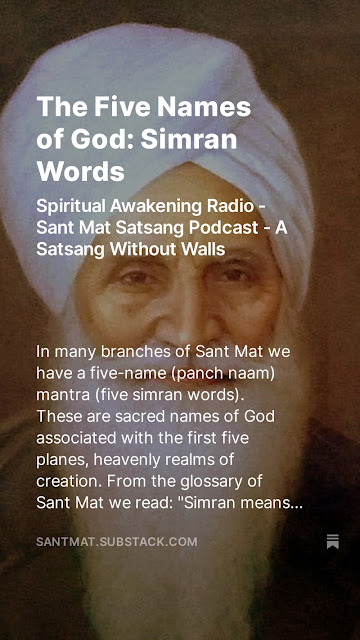
#Spirituality #Meditation #Simran #Satsang #God #SantMat #Radhasoami #SuratShabdYoga #Gnosticism #Kabbalah #DeadSeaScrolls #Podcasts #SpiritualAwakeningRadio #SpiritualityPodcasts #SpiritualPodcasts #Sant_Mat #Radha_Soami #Radhaswami #Radhasoamiji #ScienceOfTheSoul #ScienceOfSpirituality #RSSB #RSSBBeas #RssbQuote #ThirdEye #ThirdEyeOpen #ThirdEyeThoughts #ThirdEyeAwakening #ThirdEyeChakra #3rdEye
#simran#names of God#prayer of the name#sacred names#mantras#jappa#meditation#spirituality#spiritual awakening radio#podcast#mysticism#gnosticism#kabbalah#dead sea scrolls#sant mat#radhasoami#satsang
15 notes
·
View notes
Text
“Beware of becoming too sure of your beliefs, because you run the risk of dissociation, or losing touch with parts of yourself. That is why the irrational and spontaneous are so precious to the student of spirituality. The 'irrational' circumnavigates the rational mind and by that allows the unconscious to manifest. The spontaneous and flexible person, who is not afraid of non-rational impulses, unorthodox behaviors, poetry, and dreams, in other words, the totality of being, acquires a unitive nature.”
Laurence Galian
The Sun at Midnight: The Revealed Mysteries of the Ahlul Bayt Sufis

13 notes
·
View notes